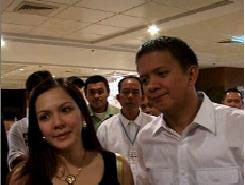(This is a reprint of a Newsbreak article written by an officer of the Army who died in 2005. I met this intelligent person in a flight to Pagadian where we were seated together. I never knew him then as we engaged in an intelligent discussion about the government. Few days later, I saw him in the Tabak Division Officers' Club with his father, the former Commanding General of the Tabak Division, Raymundo Jarque who is now with the New Peoples' Army(NPA). It is just unfortunate that Rene, a West Point graduate, the writer is now in another world when all he wrote hereunder were exposed today during a Senate hearing, i just wish that the expose will lead us to something concrete. Trillanes was right after all. )
By RENE JARQUE
Something is terribly amiss when soldiers have to buy their own medicines because military hospitals don’t have enough, and lieutenants use their salary to buy provisions when rations fall short. And it is criminal when this is happening while the generals and senior officers in Manila enjoy generous allowances for personal expenses.
These allowances, also called IP or Incentive Pay, are taken from the Armed Forces of the Philippines (AFP) budget and illegally converted to cash. The higher the rank, the higher the IP. Offices with big budgets also give sizeable allowances such as J3 (Operations, with a huge Cafgu budget), J-6 (Comptroller, which controls the fund releases), and J2 (Intelligence, with its non-accountable funds). Some officers even consider the “IP factor” in their choice of assignment.
Foreign travel is another source of pocket money. It’s SOP for an officer going on schooling or official business abroad to call on offices for pabaon. The more offices, the more money he can collect, sometimes enough to buy a car or house. Pabaon is part of the booty in a well-funded office, and even if an officer is unqualified or not needed for a trip, he is allowed to go because it is his turn to “enjoy and earn.”
This allowance system has existed for a long time, at the headquarters of the Army, Navy, and Air Force, the general headquarters in Camp Aguinaldo, and the Department of National Defense. All chiefs of staff, many of whom have become department secretaries, congressmen, and senators, are aware of this system, and they tolerate, even promote it. They were or are, in fact, principal beneficiaries. This stipend scheme is reckless and immoral as every peso allowance the generals get means less for the soldier—fewer combat boots, medicines, bullets. It is corruption in disguise and must be stopped.
In the cases of Maj. Gen. Carlos Garcia and Col. George Rabusa, both members of the comptroller family, the trail of corruption goes way up to former generals, Cabinet members, and even lawmakers who use the AFP as a conduit for their pork barrel. Even if prosecuted, the two may only end up as sacrificial pawns to protect the other generals and politicians who, like Mafia godfathers, cover up the crimes of the organization.
The case will be a test for President Arroyo and the AFP on how far they will go to curb corruption in the military, an often-cited reason for destabilization and coup attempts. Given the political risks and the influential personalities involved, we can expect flippant efforts, cover-ups and story spinning. Will the generals allow the prosecution of one of their own who was caught for a crime that everyone is guilty of?
The chain of command may not realize it now as they are busy orchestrating damage control, but I believe that the AFP again finds itself in a crossroad in the battle against corruption and unprofessionalism. Whatever actions are taken and what happens to the investigation of the Garcia-Rabusa case will determine the direction and tempo of reform in the future. If nothing comes of it, the opportunity will be lost again and corruption will continue.
There have been crossroads in the past. Edsa 1 and Edsa 2 failed to reform the AFP. There was the AFP Modernization Program, which never took off, and the case involving the Retirement Service and Benefits System wherein the generals used the soldiers’ retirement fund for imprudent investments that lined their pockets. Another was the investigation into the construction of the AFP theater in Camp Aguinaldo; the money could have been better used to modernize a dilapidated hospital. And recently, the Feliciano Commission that was created after the 2003 Oakwood mutiny. Still, there have been no serious efforts at reform. It seems that AFP reform has always lain outside the radar screen of the commanders in chief since Edsa 1 and they are fully accountable for this negligence.
In this age of information and social responsibility, the military stands as an anachronism, a relic of martial law. It continues to be irresponsible and corrupt. Many of the unprofessional and unethical practices during martial law still exist; almost certainly a major factor is that the chiefs of staff and the senior officers are holdovers from the Marcos era.
It is the hope of many honest soldiers that the Garcia-Rabusa case will be used as an occasion to genuinely tackle corruption in the military, to restore the honor and dignity of the military profession and the organization. The wholesale corruption in the AFP, symbolized by the allowance system, must be purged once and for all so that it can truly become professional.
The Filipino people expect no less. We are no longer in the martial law days when information and the media were controlled. Filipinos now are more informed, even more opinionated, and, looking at the two Edsa revolts, less tolerant of crooked governance. For a better Armed Forces and for our country’s future, I hope that President Arroyo, as commander in chief, will have the political will to stop this nonsense or this might well obliterate the already sagging morale of the soldiers, fuel large-scale discontent in the ranks, and cause her eventual downfall.

-----------------
The author was an AFP officer and a graduate of West Point. He died in August 2005. GET TO KNOW RENE JARQUE HERE.
 |
| FORMER GENERAL RAYMUNDO JARQUE |





















































